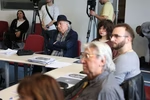International relations professor: Nationalists love talking about borders

The border situation in the Balkans is the favourite subject for nationalists, and Bosnia’s problem is that two-thirds of its government does not feel the country is their homeland, international relations professor Esref Kenan Rasidagic told N1 on Tuesday.
Oglas
“With a lack of progress that would change the lives of the people, a nonsensical issue is being raised. The issue of the borders is the favourite subject for nationalists in the Balkans,” Rasidagic said, adding that not a lot of attention should be given to the narrative.
He also commented on a recent statement by former UK diplomat Timothy Less, who said recently that there will be no peace in the Balkans unless a greater Serbia, Croatia and Albania are established.
“This is not the first time he is making such statements. He did it two years ago, and his statement was published by some serious British newspapers,” Rasidagic said, alleging that Less is a lobbyist, who is being paid by Bosnia’s Serb-dominated semi-autonomous entity of Republika Srpska (RS), Serbia and Croatia.
Oglas
He pointed out that the stance Less and people like him are expressing is not the official stance of the UK.
“They are working toward Republika Srpska integrating into Serbia in the long-term, to produce a deadlock. That is the declared policy of Serbia, as well as Croatia. Such a policy will continue,” he said.
Rasidagic also said that the problem in Bosnia is that it is populated by three peoples, but only one of them feels that the country is their homeland.
“I think Bosnia and Herzegovina is the only case in history where two-thirds of the government is working against the state. They are saying they don’t love their state, they work against it, and they are ministers in some key sectors,” he said. “I strongly believe in this state, as I have no reserve state. It is difficult to understand people who grew up here, are earning their livelihood here, but working against it (Bosnia).”
Oglas
According to the professor, the times of war have passed and there is little possibility that any conflicts will take place in the near future.
He also laid out a possible solution to the problems in Bosnia - stronger engagement by the European Union.
“When the EU understands that Bosnia and Herzegovina has a ‘Frankenstein’ Constitution and when it gets proactively engaged in solving the problems and tells Serbia that its membership within the EU is questionable if the country does not change its stance toward Kosovo and Bosnia and Herzegovina, I think that would help solve the problems in the relations within Bosnia,” he said.
Kakvo je tvoje mišljenje o ovome?
Učestvuj u diskusiji ili pročitaj komentare
Oglas
Kakvo je tvoje mišljenje o ovome?
Učestvuj u diskusiji ili pročitaj komentare
Oglas
NAJČITANIJE
Oglas
Oglas
Najnovije
Oglas
Oglas





 Srbija
Srbija
 Hrvatska
Hrvatska
 Slovenija
Slovenija



























































